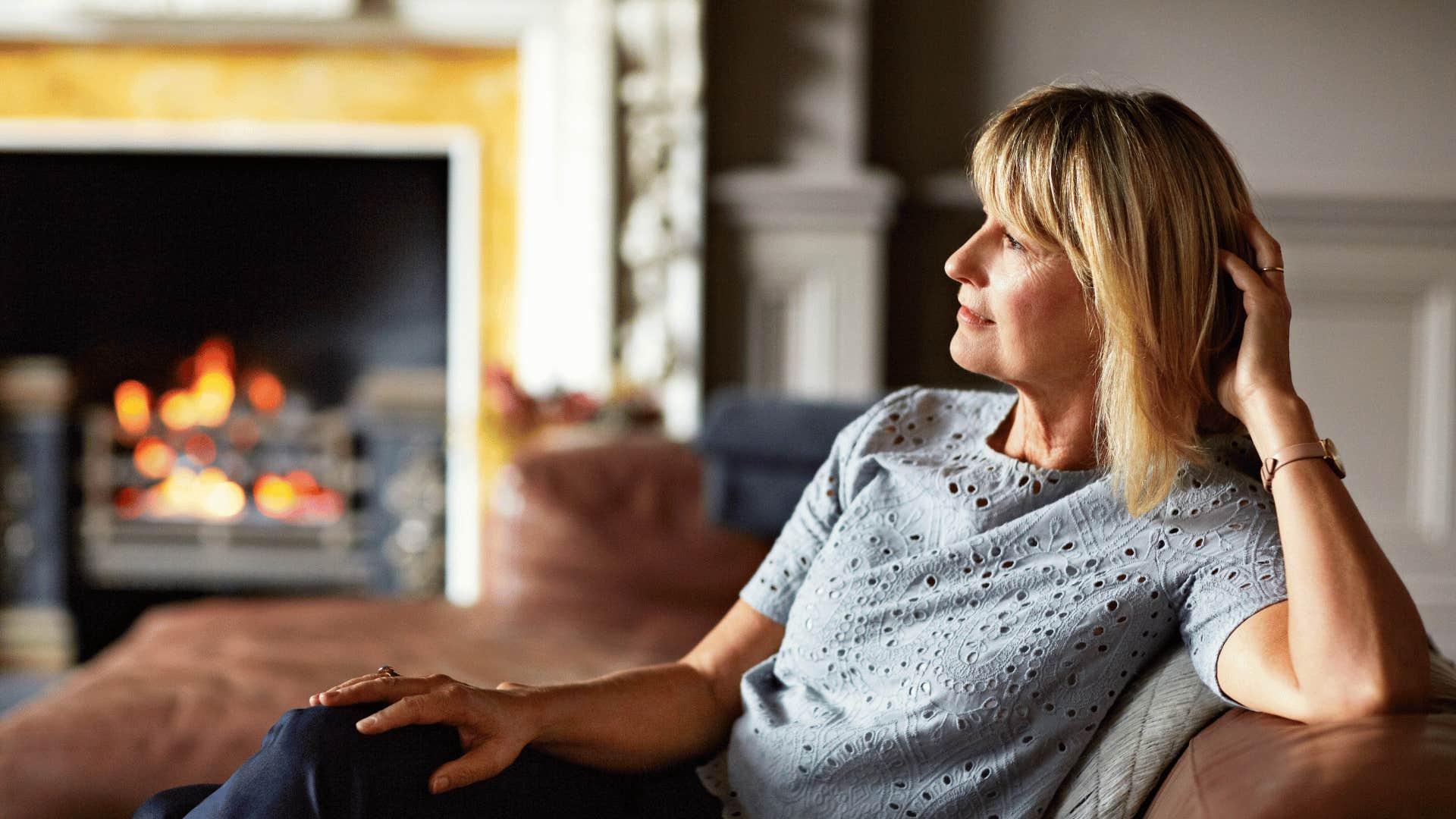People Who’d Rather Be Alone Than Socialize With Literally Anyone Usually Have These 11 Reasons
Not wanting to socialize with anyone at all is a perfectly reasonable stance for many people.
 simona pilolla 2 / Shutterstock
simona pilolla 2 / Shutterstock There’s a big difference between being alone and being lonely, but most people confuse one for the other. It’s totally possible to feel lonely even though you’re surrounded by people, and it’s also possible to feel fulfilled when you’re on your own.
People who’d rather be alone than socialize with literally anyone usually have deeply personal reasons for choosing solitude. They’re not scared to sit with their thoughts and see what they discover. They don’t think that being alone means they’re lacking. They think that finding joy in solitude shows how rich their inner life really is.
People who’d rather be alone than socialize with literally anyone usually have these 11 reasons
1. They can’t stand small talk
 Robert Kneschke via Canva
Robert Kneschke via Canva
People who’d rather be alone than socialize with literally anyone can’t handle small talk, no matter how pleasant the conversation is. They see small talk as a form of spiritual torture, disguised as common courtesy. According to Jenn Granneman, the founder of the online community “Introvert, Dear,” the reason that introverts hate small talk is simple: Surface-level conversations drain their social battery without offering any nourishment in return.
She shared a quote from the book “Introvert Power” by Dr. Laurie Helgoe: “Introverts do not hate small talk because we dislike people. We hate small talk because we hate the barrier it creates between people.”
Introverts want conversations to be avenues for connection. They don’t care that it’s supposed to rain all weekend; they want to know how stormy weather makes you feel. They don’t want to stick to safe topics; they want to see who you really are. Introverts seek out the ties that bind us. They have no use for small talk, since it’s designed to conceal inner landscapes instead of revealing them.
2. They enjoy their own company
 xijian from Getty Images Signature via Canva
xijian from Getty Images Signature via Canva
At its best, socializing is a source of joyful connection. At its worst, socializing is a distraction that keeps people from knowing themselves. If you’re constantly surrounded by other people, you don’t have to look inward. You avoid the emotional heavy lifting that leads to personal growth.
People who’d rather be alone than socialize with literally anyone actually enjoy their own company. They understand that the only way out is through. They’re committed to self-reflection, even when it hurts, because they know it will eventually provide them with a sense of peace.
They see no reason to measure value according to anyone else. They’ve spent enough time in quiet contemplation to know their true worth.
“When you're a busy person and your mind is full of all the things you haven't yet done, you can easily and mistakenly lead yourself to believe that you aren't enough,” life and career transformation coach Lisa Petsinis explained. “You tell yourself that you're missing out, and instead, you're overlooking all that you have and the beautiful person you are.”
“To be happy, you need to fall in love with yourself,” she shared. “That means intentionally focusing on self-care and bringing more joy to every day.”
3. They put their peace first
 kupicoo from Getty Images Signature
kupicoo from Getty Images Signature
For people who’d rather be alone than socialize with literally anyone, protecting their energy is a valid reason to turn down plans and stay at home. They don’t say “no” from a place of hostility, they say “no” to set boundaries and put their peace first.
As therapist Julie Schmit of Wild Tree Wellness pointed out, “Energetically speaking, boundaries are the container of the self, where you end and another person begins… Losing them happens when you merge with other people’s feelings and you lose your sense of self.”
“If you can’t affirm your boundaries, it will be difficult to trust your ability to maintain your own truth, whether it’s your mood, your beliefs, or your circumstances,” she shared.
By centering their needs, people who’d rather be alone can avoid energetic chaos and stay true to their own reasons for doing so.
4. They have JOMO
 Tassii from Getty Images Signature via Canva
Tassii from Getty Images Signature via Canva
Having FOMO is a widely accepted reason to socialize with literally anyone, but people who’d rather be alone reject the concept of FOMO altogether. They take the opposite approach and cultivate JOMO, the joy of missing out.
“It's very easy to get in the habit of always letting your FOMO take control,” psychologist Nick Wignall explained. “When you do, your long-term values, commitments, health and peace of mind suffer.”
“Embracing the joy of missing out simply means reminding yourself that even though you might be missing out on something enjoyable now, you're gaining something far greater: The long-term joy that comes from keeping promises to yourself,” he revealed.
People who’d rather be alone don’t care about anyone else’s plans. They don’t care that their friends keep texting them with increasing urgency. They remain unbothered. They have no reason to leave the comfort of their couch. They have everything they need: Their favorite book, their coziest pajamas, a mug of tea with the perfect amount of honey stirred in. They’re more than happy to miss out.
5. Their favorite hobbies are solitary activities
 Sam Lion from Pexels
Sam Lion from Pexels
People who’d rather be alone than socialize with literally anyone focus their energy on solitary hobbies. It’s not that they’re reclusive or aloof, it’s that they know what they like and they see no reason to compromise the things that make them feel fulfilled.
They channel their lone wolf tendencies into self-sustaining activities. They go on solo hikes, they browse through stacks of vinyl at thrift stores. They’re expert puzzlers and kitchen connoisseurs. They don’t need outside witnesses to know they’re having fun. They source their sense of happiness from within.
6. They get exhausted by big crowds
 Tinpixels from Getty Images Signature
Tinpixels from Getty Images Signature
On the rare occasion that people who’d rather be alone find themselves in a hectic social situation, they gather every reserve of energy they have. They do their best to channel their inner social butterfly, but at some point, they lose motivation. They’re too tired to keep going. They listen to what they need and make a quick yet graceful exit.
Jenn Granneman explained the science behind social fatigue, pointing to a study that discovered both introverts and extroverts hit their limit after three hours of socializing. In light of those findings, Granneman shared the reason why socializing is such a draining experience for introverts.
“Extroverts have a more active dopamine reward system than introverts,” she explained. “Having a more active dopamine reward system means that extroverts get more energized and excited by the possibility of reward than introverts.
In contrast, “introverts tend to turn inward… The introvert’s way isn’t about chasing rewards, but rather about seeking meaning.” Hanging out with a couple of close friends is all the socializing an introvert needs, and even then, they need time on their own to recharge.
7. Boredom can be inspiring
 Tinpixels from Getty Images Signature
Tinpixels from Getty Images Signature
People who’d rather be alone than socialize with literally anyone give new meaning to saying, “Only boring people get bored.” They accept the fact that life can’t be exciting all the time. They have no interest in scrolling social media to stave off boredom. They make the active decision to sit around and be bored, because they’re highly aware of how inspiring boredom can be.
“Taking pauses can have profound positive impacts,” the Human Capital Leadership Review explained. “Silence allows space for reflection, incubation of ideas and recharging mentally and physically.”
In silence, we can let our minds wander. We make connections and uncover new ideas. Silence optimizes our ability to focus, guiding us into that elusive “deep flow” state. When we welcome silence into our lives, we allow ourselves to simply exist, without any external pressure to perform.
8. Doing nothing is nourishing
 gradyreese from Getty Images Signature via Canva
gradyreese from Getty Images Signature via Canva
People who’d rather be alone than socialize with literally anyone are masters of the fine art of doing absolutely nothing at all. They don’t put any pressure on themselves to push past their own limits or overextend themselves for other people’s benefit.
They know that doing nothing in a world that demands they stay busy is an act of self-care and an expression of true self-love.
9. Being alone protects them
 RealPeopleGroup from Getty Images via Canva
RealPeopleGroup from Getty Images via Canva
Sometimes, people who’d rather be alone than socialize with literally anyone separate themselves as a form of self-defense. As healthy as self-sufficiency is, there is such a thing as being too independent. Protecting their inner peace is important, but it shouldn’t come at such a high cost.
Being alone can be a way to build walls between yourself and the possibility of getting hurt. The more you know yourself, the easier it is to decide how you want to exist in the world. According to therapist Susan Saint-Welch, “Finding yourself means becoming aware of those around you, what makes you happy and what does not, and when you feel good about yourself and when you don't.”
“Finding yourself requires a little introspection to determine what you don't want in your life,” she continued. “Examine this window into your true self by determining if the choices you make really work for you.”
“Don't be afraid to be who you really are,” she concluded. “The right people around you will truly want you to be happy and healthy.”
10. Silence is a life force
 PeopleImages from Getty Images Signature via Canva
PeopleImages from Getty Images Signature via Canva
Silence is often seen as something that detracts, but silence is actually a life force. Positive psychologists believe that silence can enhance people’s self-awareness, elevate their spiritual practices and expand their perspective.
More than anything else, being silent collapses the barriers between a person’s external and internal selves to give them deeper insight into who they are. Silence is a moment to stand still. It lets people take account of their bodies: the steady thrum of their heart, beating. They way their lungs pull in air, then release it. How they’re still here, in motion, transforming.
11. Being quiet heightens their intuition
 shapecharge from Getty Images Signature
shapecharge from Getty Images Signature
People who’d rather be alone than socialize with literally anyone know that being on their own is an entry point for becoming their higher selves. They revel in solitude. Being quiet helps them hear their inner voice and trust their intuition.
Intuitive clairvoyant teacher Aimee Leigh described intuition as “a spontaneous and instinctive understanding or insight without the need for conscious reasoning.”
Being alone connects you to the version of you that exists when no one else is around. With time, you’ll gain a deeper understanding of everything you think and feel. As Leigh explained, finding comfort in your aloneness lets you make “the shift from living in fear and disconnection to love, certainty, and empowerment. “This is when we are truly free and are living an intuitive life.”
“Fall in love with your intuition and commit to creating a healthy, loving relationship in which you communicate daily, fostering trust, awareness, and empowerment,” she advised. “Vow to have yourself be your own guide and allow your intuition to lead the way.”
Alexandra Blogier, MFA, is a staff writer who covers psychology, social issues, relationships, self-help topics, and human interest stories.

